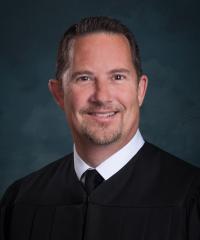Administration
Administrative Structure of the Nebraska Judicial Branch
State Court Administrator
Corey R. Steel was appointed State Court Administrator on May 2, 2014, to oversee the administrative operations of the statewide Judicial Branch. The State Court Administrator plans for statewide Judicial Branch needs, budget preparation, develops and promotes statewide administrative practices and procedures, oversees the operation of trial court programs, probation based programs and services, strategic initiatives, and serves as a liaison to other branches of government.
Corey began his Judicial Branch career in May 1998 in Probation. He worked in many different capacities with probation from drug technician, Intensive Supervision Probation Officer to Juvenile Probation Officer until May of 2000. His work then took him to Lancaster County as a Juvenile Justice Coordinator where he worked until October 2007. In October 2007, Corey came back to Probation to fill the newly-created Juvenile Justice Program Specialist position in the Office of Probation Administration, served as Chief Probation Officer for 2 Probation Districts, and rose to the level of Deputy Probation Administrator for Juvenile Justice until appointed State Court Administrator in 2014.
The Administrative Office of the Courts and Probation
AOC Vision, Mission, and Core Values
Vision
Be a trusted, collaborative, and respected catalyst for and provider of professional court administrative services.
Adopted March 5, 2015
Mission
Under the direction of the Nebraska Supreme Court, the Administrative Office of the Courts’ mission is to ensure the public has equal access to justice using leadership, education, technology, and administrative services to implement consistent, efficient, and effective court practices.
Adopted January 15, 2015
Core Values
To accomplish our mission and pursue our vision, the Nebraska Administrative Office of the Courts is guided by these core values:
- Integrity and Professionalism: As staff of the Administrative Office of the Courts, we hold ourselves to high ethical principles of integrity and professionalism. The principles of integrity and professionalism include fairness and impartiality; respect for the judiciary, colleagues and the public; responsiveness to the needs of a diverse population; and commitment to high quality service and faithful discharge of official duties.
- Innovation and Continuous Improvement: The need for continuous improvement and innovation drives the Administrative Office of the Courts’ efforts to provide resources and services to the courts and court users. As the public’s expectations for access to justice grow and change, we value innovation in advancing court practices, administrative services, and technology.
- Accountability: It is incumbent upon the Administrative Office of the Courts to be vigilant in our efforts to uphold and practice high standards of accountability. Accountability entails taking responsibility for complying with legal, policy and ethical rules in the performance of the functions of the Office. The core value of accountability includes good stewardship of public funds and property, effective and efficient use of resources, and open dissemination of disclosable information.
- Excellence: The Administrative Office of the Courts is committed to excellence in leadership, administration, and management. Consistent court practices are valued to ensure excellence for all court users. A high value is placed on rigorous and active continuing education, effective personnel recruitment, and development and retention of highly competent and diverse court staff.
Adopted April 2, 2015
Divisions and Offices
All programming is planned in accordance with the Nebraska Judicial Branch Strategic Agenda.
- Court Services Division provides management support for the courts. This division is responsible for communicating Supreme Court administrative policy and providing procedural standards and publications for court operations. As well as administering Dispute Resolution and Mediation, Language Access, Self-Represented Litigant Resources.
- The Nebraska Probation System ensures administrative functions to provide central management of Probation services.
- Adult Probation Services encompasses pre-sentence investigations, assessments, and Community Based Intervention and reentry supervision. All rehabilitation programming provides an array of behavioral health and supportive services through registered service providers.
- Juvenile Probation Services offers an array of pre and post adjudication services including intake, placement, investigations, case management, reentry. Rehabilitation programming addresses behavioral health through registered service providers.
- Information Technology Division support and enhancement for the statewide computer system and related projects.
- Judicial Branch Education provides in-house programming for court staff, probation, and judges, as well as attorneys and others who serve Nebraska Courts. The division also administers Mandatory Continuing Legal Education and Attorney Services.
- Operations Division provides an array of internal and external services for the Judicial Branch including Communications, Interstate Compact, Personnel, and Research and Data.
- Court Improvement Project provides resources and program development designed for the protection/care of children who become involved in the court system.
- Office of Public Guardian serves as a means of last resort as guardian or conservator where no family member or suitable individual is available.
- Counsel for Discipline protects the public, the legal profession, and our system of justice from the unethical conduct of attorneys.
Additional Offices and Functions
- Clerk of the Supreme Court and Court of Appeals is responsible for case management and processing for the appellate courts.
- Reporter of Decisions edits and publishes all Supreme Court and Court of Appeals decisions.
- State Library offers free public access to Nebraska Westlaw cases, experienced library staff and quiet spaces for research on the third floor, south side of the State Capitol in Room 325.


